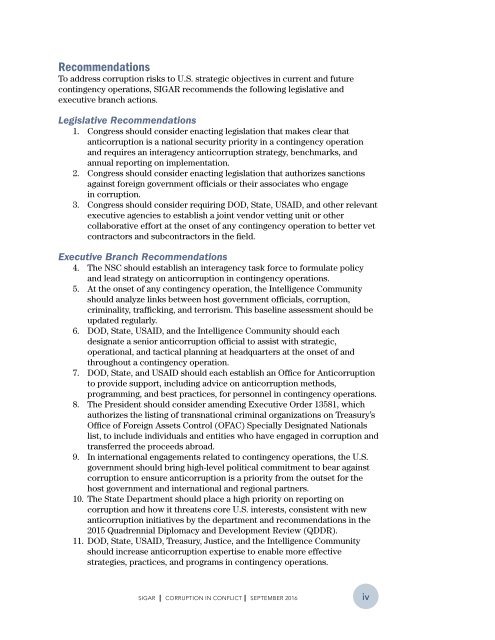CORRUPTION IN CONFLICT
5IlaWjQej
5IlaWjQej
You also want an ePaper? Increase the reach of your titles
YUMPU automatically turns print PDFs into web optimized ePapers that Google loves.
Recommendations<br />
To address corruption risks to U.S. strategic objectives in current and future<br />
contingency operations, SIGAR recommends the following legislative and<br />
executive branch actions.<br />
Legislative Recommendations<br />
1. Congress should consider enacting legislation that makes clear that<br />
anticorruption is a national security priority in a contingency operation<br />
and requires an interagency anticorruption strategy, benchmarks, and<br />
annual reporting on implementation.<br />
2. Congress should consider enacting legislation that authorizes sanctions<br />
against foreign government officials or their associates who engage<br />
in corruption.<br />
3. Congress should consider requiring DOD, State, USAID, and other relevant<br />
executive agencies to establish a joint vendor vetting unit or other<br />
collaborative effort at the onset of any contingency operation to better vet<br />
contractors and subcontractors in the field.<br />
Executive Branch Recommendations<br />
4. The NSC should establish an interagency task force to formulate policy<br />
and lead strategy on anticorruption in contingency operations.<br />
5. At the onset of any contingency operation, the Intelligence Community<br />
should analyze links between host government officials, corruption,<br />
criminality, trafficking, and terrorism. This baseline assessment should be<br />
updated regularly.<br />
6. DOD, State, USAID, and the Intelligence Community should each<br />
designate a senior anticorruption official to assist with strategic,<br />
operational, and tactical planning at headquarters at the onset of and<br />
throughout a contingency operation.<br />
7. DOD, State, and USAID should each establish an Office for Anticorruption<br />
to provide support, including advice on anticorruption methods,<br />
programming, and best practices, for personnel in contingency operations.<br />
8. The President should consider amending Executive Order 13581, which<br />
authorizes the listing of transnational criminal organizations on Treasury’s<br />
Office of Foreign Assets Control (OFAC) Specially Designated Nationals<br />
list, to include individuals and entities who have engaged in corruption and<br />
transferred the proceeds abroad.<br />
9. In international engagements related to contingency operations, the U.S.<br />
government should bring high-level political commitment to bear against<br />
corruption to ensure anticorruption is a priority from the outset for the<br />
host government and international and regional partners.<br />
10. The State Department should place a high priority on reporting on<br />
corruption and how it threatens core U.S. interests, consistent with new<br />
anticorruption initiatives by the department and recommendations in the<br />
2015 Quadrennial Diplomacy and Development Review (QDDR).<br />
11. DOD, State, USAID, Treasury, Justice, and the Intelligence Community<br />
should increase anticorruption expertise to enable more effective<br />
strategies, practices, and programs in contingency operations.<br />
SIGAR I <strong>CORRUPTION</strong> <strong>IN</strong> <strong>CONFLICT</strong> I SEPTEMBER 2016<br />
iv


